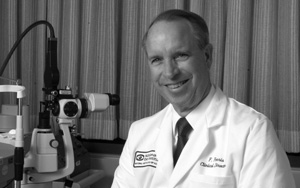 Frederick L. Ferris III, M.D. is the director of the Division of Epidemiology and Clinical Applications and the clinical director at the National Eye Institute (NEI), National Institutes of Health (NIH). Dr. Ferris earned his A.B. at Princeton University and his M.D. at Johns Hopkins University. Following medical school, he came to the NEI in 1973. Dr. Ferris became a board certified ophthalmologist following the completion of his residency at Johns Hopkins Hospital in 1978. In addition, Dr. Ferris is a board certified epidemiologist.
Frederick L. Ferris III, M.D. is the director of the Division of Epidemiology and Clinical Applications and the clinical director at the National Eye Institute (NEI), National Institutes of Health (NIH). Dr. Ferris earned his A.B. at Princeton University and his M.D. at Johns Hopkins University. Following medical school, he came to the NEI in 1973. Dr. Ferris became a board certified ophthalmologist following the completion of his residency at Johns Hopkins Hospital in 1978. In addition, Dr. Ferris is a board certified epidemiologist.
Dr. Ferris is a medical retina specialist at the NEI. Throughout his 35 years at the NEI Dr. Ferris has had extensive experience in designing and managing clinical trails (of Phase 1, 2 and 3) at the NIH Clinical Center. Dr. Ferris was the project officer of the Diabetic Retinopathy Study, co-chairman of the Early Treatment Diabetic Retinopathy Study (ETDRS) and chairman of the Age-Related Eye Disease Study (AREDS). These studies followed thousands of patients for nearly a decade, and determined that photocoagulation (the use of an intense beam of light, such as a laser to seal off blood vessels or destroy tissue) could reduce the risk of blindness in people with proliferative diabetic retinopathy by more than 90 percent. In addition, the studies illustrated that nutritional supplements could reduce the risk of blindness due to age-related macular degeneration (AMD) by 25 percent.
Currently, he is actively involved in the Diabetic Retinopathy Clinical Research Network and Age-Related Eye Disease Study 2 (AREDS2), a Phase 3 study which is investigating the use of lutein/zeaxanthin (found in leafy greens such as kale) and/or omega-3 polyunsaturated fatty acids as treatment for AMD.
